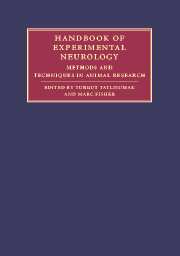Book contents
- Frontmatter
- Contents
- List of contributors
- Part I Principles and general methods
- 1 Introduction: Animal modeling – a precious tool for developing remedies to neurological diseases
- 2 Ethical issues, welfare laws, and regulations
- 3 Housing, feeding, and maintenance of rodents
- 4 Identification of individual animals
- 5 Analgesia, anesthesia, and postoperative care in laboratory animals
- 6 Euthanasia in small animals
- 7 Various surgical procedures in rodents
- 8 Genetically engineered animals
- 9 Imaging in experimental neurology
- 10 Safety in animal facilities
- 11 Behavioral testing in small-animal models: ischemic stroke
- 12 Methods for analyzing brain tissue
- 13 Targeting molecular constructs of cellular function and injury through in vitro and in vivo experimental models
- 14 Neuroimmunology and immune-related neuropathologies
- 15 Animal models of sex differences in non-reproductive brain functions
- 16 The ependymal route for central nervous system gene therapy
- 17 Neural transplantation
- Part II Experimental models of major neurological diseases
- Index
- References
13 - Targeting molecular constructs of cellular function and injury through in vitro and in vivo experimental models
Published online by Cambridge University Press: 04 November 2009
- Frontmatter
- Contents
- List of contributors
- Part I Principles and general methods
- 1 Introduction: Animal modeling – a precious tool for developing remedies to neurological diseases
- 2 Ethical issues, welfare laws, and regulations
- 3 Housing, feeding, and maintenance of rodents
- 4 Identification of individual animals
- 5 Analgesia, anesthesia, and postoperative care in laboratory animals
- 6 Euthanasia in small animals
- 7 Various surgical procedures in rodents
- 8 Genetically engineered animals
- 9 Imaging in experimental neurology
- 10 Safety in animal facilities
- 11 Behavioral testing in small-animal models: ischemic stroke
- 12 Methods for analyzing brain tissue
- 13 Targeting molecular constructs of cellular function and injury through in vitro and in vivo experimental models
- 14 Neuroimmunology and immune-related neuropathologies
- 15 Animal models of sex differences in non-reproductive brain functions
- 16 The ependymal route for central nervous system gene therapy
- 17 Neural transplantation
- Part II Experimental models of major neurological diseases
- Index
- References
Summary
Introduction
At present, over 23 million people in the United States suffer from central nervous system disorders. Globally, this number reaches a level of 368 million people. Yet, no effective therapy for the prevention or treatment of acute or chronic neuronal injury exists. As a result, identification of novel cellular pathways that determine neuronal survival and regulate programmed cell death or apoptosis in the nervous system become essential for the effective development of therapeutic strategies against neuronal injury. To achieve this goal, use of both in vitro and in vivo models of cell injury become essential to elucidate the mechanisms that determine intrinsic cell destruction and inflammatory cell demise.
In this chapter, we provide detailed methods for the preparation and analysis of experimental cell injury in several different cell and tissue animal models employed in the Maiese laboratory. The cell cultures from the central nervous system can provide a unique tool for the investigation of the cellular and molecular mechanisms that are involved in acute and chronic neurodegenerative disease. The utilization of a cell culture system avoids the complex environment of tissue or animal models that require multiple cell types to function in concert. By using isolated living cells, studies can focus upon specific signal transduction pathways that determine cellular function and cellular response to injury. Ultimately, knowledge gained at the cellular level must be transferred into experimental animal models in order to fully comprehend the physiological and pathological function of the brain.
Information
- Type
- Chapter
- Information
- Handbook of Experimental NeurologyMethods and Techniques in Animal Research, pp. 181 - 211Publisher: Cambridge University PressPrint publication year: 2006
